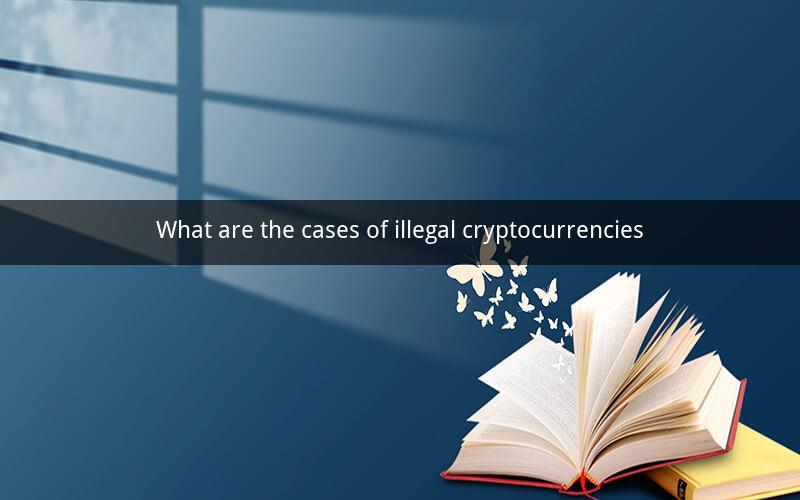
Table of Contents
1. Introduction
2. Understanding Illegal Cryptocurrencies
3. Cases of Illegal Cryptocurrencies
3.1. Ponzi Schemes
3.2. Scams
3.3. Illegal Activities
3.4. Illegal Exchanges
4. The Impact of Illegal Cryptocurrencies
5. The Role of Regulators
6. Conclusion
1. Introduction
Illegal cryptocurrencies have been a growing concern for regulators, investors, and users worldwide. These cryptocurrencies are used for various illegal activities, including money laundering, financing terrorism, and Ponzi schemes. In this article, we will discuss the cases of illegal cryptocurrencies and their impact on the market.
2. Understanding Illegal Cryptocurrencies
Illegal cryptocurrencies are digital assets that are used for unauthorized activities, often bypassing the traditional financial system. These cryptocurrencies are often associated with anonymity, making them an attractive tool for criminals. Some of the illegal activities that involve illegal cryptocurrencies include money laundering, financing terrorism, and conducting fraudulent activities.
3. Cases of Illegal Cryptocurrencies
3.1. Ponzi Schemes
Ponzi schemes are fraudulent investment scams where early investors are paid returns from the funds of new investors. The scheme collapses when there are not enough new investors to sustain the payments. One of the most notorious cases of Ponzi schemes involving cryptocurrencies is the BitConnect scam. The company promised high returns to investors and raised billions in cryptocurrency before it was revealed as a Ponzi scheme.
3.2. Scams
Scams involving cryptocurrencies are widespread, with perpetrators using various tactics to deceive investors. One example is the Bitcoin Revolution scam, where individuals were promised significant returns on their investments in exchange for a small fee. However, the company vanished with the investors' money, leaving them in the lurch.
3.3. Illegal Activities
Illegal activities such as drug trafficking and cybercrime often use cryptocurrencies to facilitate transactions. For instance, the Silk Road online marketplace, which was shut down by the FBI in 2013, used Bitcoin to facilitate the sale of illegal drugs. Since then, other dark web markets have popped up, using various cryptocurrencies to continue the illegal trade.
3.4. Illegal Exchanges
Illegal exchanges are platforms that trade cryptocurrencies without adhering to regulatory standards. These exchanges often operate without proper licensing and are susceptible to hacking and fraud. The case of BitMEX, a cryptocurrency derivatives trading platform, illustrates the risks associated with illegal exchanges. The platform was hacked, resulting in a loss of millions in cryptocurrencies.
4. The Impact of Illegal Cryptocurrencies
Illegal cryptocurrencies have several negative impacts on the market. Firstly, they undermine the integrity of the cryptocurrency market, leading to skepticism and mistrust among investors. Secondly, they can cause significant financial losses to individuals and organizations. Lastly, illegal cryptocurrencies can pose a threat to public safety, as they are often used to finance illegal activities.
5. The Role of Regulators
Regulators worldwide are working to combat illegal cryptocurrencies. They are implementing laws and regulations to monitor and control the use of cryptocurrencies for illegal activities. Additionally, regulators are collaborating with law enforcement agencies to identify and shut down illegal exchanges and platforms.
6. Conclusion
Illegal cryptocurrencies pose a significant threat to the market and public safety. Understanding the cases of illegal cryptocurrencies and their impact can help raise awareness and take necessary actions to combat this issue. It is crucial for regulators, investors, and users to work together to create a safer and more transparent cryptocurrency market.
FAQs
1. What is a Ponzi scheme?
A Ponzi scheme is a fraudulent investment scam where early investors are paid returns from the funds of new investors.
2. Can Bitcoin be used for illegal activities?
Yes, Bitcoin and other cryptocurrencies can be used for illegal activities such as money laundering, financing terrorism, and conducting fraudulent activities.
3. How do illegal exchanges operate?
Illegal exchanges operate without adhering to regulatory standards, often without proper licensing and are susceptible to hacking and fraud.
4. What is the Silk Road marketplace?
The Silk Road marketplace was an online marketplace that used Bitcoin to facilitate the sale of illegal drugs and other illegal goods.
5. How can regulators combat illegal cryptocurrencies?
Regulators can combat illegal cryptocurrencies by implementing laws and regulations, collaborating with law enforcement agencies, and monitoring and controlling the use of cryptocurrencies for illegal activities.
6. Are all cryptocurrencies used for illegal activities?
No, not all cryptocurrencies are used for illegal activities. Many cryptocurrencies are used for legitimate purposes, such as investment, payments, and transactions.
7. What is the role of the FBI in combating illegal cryptocurrencies?
The FBI plays a crucial role in combating illegal cryptocurrencies by investigating and shutting down illegal exchanges and platforms.
8. How can individuals protect themselves from cryptocurrency scams?
Individuals can protect themselves from cryptocurrency scams by researching the legitimacy of investment opportunities, being cautious of high returns, and using secure platforms.
9. Can cryptocurrencies be used for money laundering?
Yes, cryptocurrencies can be used for money laundering due to their anonymous nature and the ease with which they can be transferred across borders.
10. How can regulators ensure the safety and transparency of the cryptocurrency market?
Regulators can ensure the safety and transparency of the cryptocurrency market by implementing strict regulations, conducting audits, and promoting the adoption of best practices among exchanges and platforms.